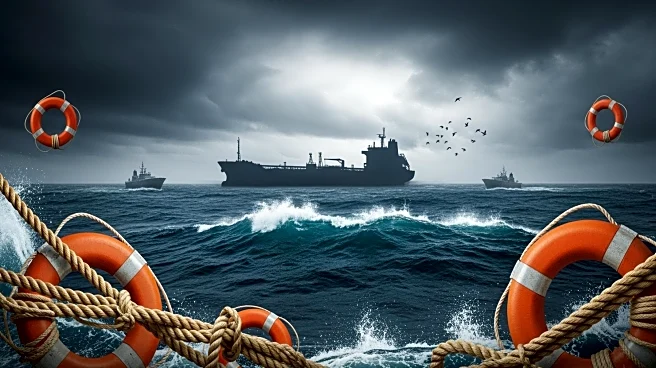What's Happening?
European Union naval forces successfully rescued 24 sailors from the Maltese-flagged oil tanker Hellas Aphrodite, which was attacked by Somali pirates off the coast of Somalia. The incident occurred when
armed pirates fired machine guns and rocket-propelled grenades before boarding the vessel. The crew managed to lock themselves inside a fortified citadel, remaining unharmed throughout the ordeal. The rescue operation, conducted by the Spanish warship ESPS Victoria under the EU's anti-piracy mission Operation Atalanta, involved a helicopter, drone, and surveillance aircraft. The pirates abandoned the ship following a show of force by the EU forces. This attack is part of a recent spate of piracy incidents in the area, raising concerns about a resurgence of such activities.
Why It's Important?
The resurgence of piracy off the coast of Somalia poses significant threats to international shipping routes, particularly those passing through East Africa's Indian Ocean. The attacks disrupt global trade, increase shipping costs due to heightened security measures, and threaten the safety of maritime personnel. The EU's successful rescue operation underscores the importance of international naval patrols in deterring piracy and ensuring the safety of commercial vessels. The ongoing threat in the region may lead to increased naval presence and collaboration among countries to combat piracy, impacting global maritime security policies.
What's Next?
The EU and other international stakeholders may consider enhancing their naval patrols and security measures in the region to prevent further piracy incidents. Shipping companies might need to reassess their routes and security protocols to mitigate risks. Additionally, diplomatic efforts could be intensified to address the root causes of piracy, such as political instability and economic challenges in Somalia. The situation may prompt discussions on international cooperation and resource allocation for maritime security.
Beyond the Headlines
The resurgence of piracy highlights broader issues of governance and economic disparity in Somalia, which contribute to the rise of criminal activities. Addressing these underlying factors requires long-term strategies involving development aid, political stabilization, and community engagement. The international community's response to piracy could also influence regional geopolitics, as countries vie for influence and control over strategic maritime routes.










